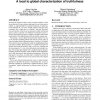Free Online Productivity Tools
i2Speak
i2Symbol
i2OCR
iTex2Img
iWeb2Print
iWeb2Shot
i2Type
iPdf2Split
iPdf2Merge
i2Bopomofo
i2Arabic
i2Style
i2Image
i2PDF
iLatex2Rtf
Sci2ools
130
click to vote
SIGECOM
2008
ACM
2008
ACM
Truthful germs are contagious: a local to global characterization of truthfulness
We study the question of how to easily recognize whether a social unction f from an abstract type space to a set of outcomes is truthful, i.e. implementable by a truthful mechanism. In particular, if the restriction of f to every "simple" subset of the type space is truthful, does it imply that f is truthful? Saks and Yu proved one such theorem: when the set of outcomes is finite and the type space is convex, a function f is truthful if its restriction to every 2element subset of the type space is truthful, a condition called weak monotonicity. This characterization fails for infinite outcome sets. We provide a local-to-global characterization theorem for any set of outcomes (including infinite sets) and any convex space of types (including infinite-dimensional ones): a function f is truthful if its restriction to every sufficiently small 2-D neighborhood about each point is truthful. More precisely, f is truthful if and only if it satisfies local weak monotonicity and is vo...
| Added | 15 Dec 2010 |
| Updated | 15 Dec 2010 |
| Type | Journal |
| Year | 2008 |
| Where | SIGECOM |
| Authors | Aaron Archer, Robert Kleinberg |
Comments (0)

